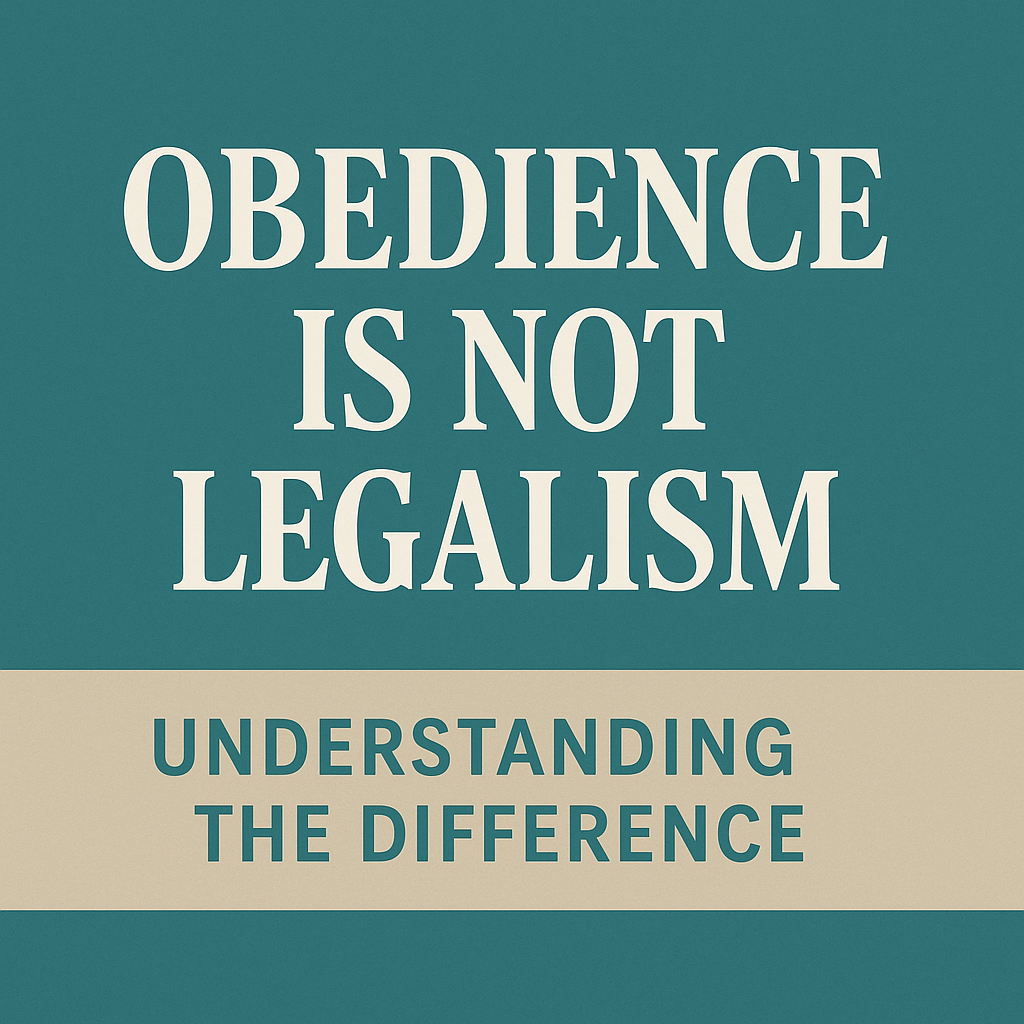⏱️ Estimated Reading Time: 4 min read
Obedience Is Not Legalism: Understanding the Difference
By Dave Jenkins
Contending for the Word – Discerning the Times Q&A Series
What’s the Difference Between Legalism and Obedience?
In every generation, Christians must be on guard against the subtle dangers of legalism while embracing the beauty of biblical obedience. Sadly, many today confuse the two labeling faithful obedience as “legalistic” while failing to recognize how legalism truly distorts the gospel.
So what’s the difference?
At its core, legalism is about trying to earn or keep God’s favor through external rule-keeping. It can take the form of salvation by legalism, where one believes they must follow rules or rituals to be saved. It can also show up as sanctification by legalism, where believers operate as though God’s ongoing approval is based on their performance. Both approaches are deeply unbiblical and spiritually destructive because they shift trust away from the finished work of Christ and place it on human effort.
Paul rebukes this mindset directly in Galatians 3:3 when he asks, “Are you so foolish? Having begun by the Spirit, are you now being perfected by the flesh?” Legalism adds to Christ’s work, distorts the gospel, and turns spiritual disciplines into burdens—ladders to climb rather than means of grace to receive. It leads to pride when we think we’re doing well and despair when we inevitably fall short.
In contrast, biblical obedience is never about merit—it’s about love. It flows from the believer’s heart because they have already been saved by grace through faith. Jesus said, “If you love me, you will keep my commandments” (John 14:15). Obedience in the Christian life is not a transaction to earn God’s love, but a response to His already-given love in Christ. True obedience is motivated by love for God, fueled by the Holy Spirit, anchored in the gospel, and directed by God’s revealed Word. As 1 John 5:3 reminds us, “For this is the love of God, that we keep his commandments. And his commandments are not burdensome.”
This is a crucial distinction: legalism seeks to earn acceptance; obedience springs from it. Legalism is rooted in fear, guilt, or pride. Obedience is rooted in faith, gratitude, and joy. Legalism is based on human effort and man-made rules. Obedience flows from God’s grace and aligns with His revealed Word. While legalism leads to burnout and pride, obedience leads to holiness and a deepening intimacy with Christ.
Understanding the difference between the two is vital. If we reject obedience because we fear legalism, we risk falling into lawlessness or spiritual apathy. But if we confuse obedience with legalism, we burden ourselves and others with a distorted gospel. Legalism distorts grace, leads to shame, and fosters toxic environments. But obedience nurtures growth, fosters joy, and bears spiritual fruit to the glory of God. It’s not about earning His favor—it’s about living in light of it.
Of course, some will ask: does grace mean we can live however we want? Paul answers that forcefully in Romans 6:1–2: “What shall we say then? Are we to continue in sin that grace may abound? By no means! How can we who died to sin still live in it?” The gospel teaches us that we are free from sin’s penalty and power, not free to sin without consequence. God’s grace is not only pardon—it is power. It teaches us to deny ungodliness and live lives marked by self-control, purity, and godliness (Titus 2:11–12).
Ultimately, the gospel makes all the difference. Legalism says, “I obey, therefore I’m accepted.” But the gospel declares, “I’m accepted in Christ, therefore I obey.” That single truth reorients the Christian life. When we grasp it, we stop striving for approval and start living in the freedom and joy of grace-fueled obedience. We grow in holiness, not because we’re trying to impress God, but because we’re resting in His love and empowered by His Spirit.
If you want to dig deeper, Paul’s letter to the Galatians is a passionate defense of the gospel against legalism. Romans 6–8 gives a powerful picture of what it means to live by grace, not by works.
In our age of confusion, many believers are tempted either to legalism or license. But the biblical way is neither fear nor merit—it’s faith working through love. Let us obey the Lord—not to earn His love, but because we already have it in Christ. That is not legalism. That is the joy of being His.
For more from Contending for the Word Q&A please visit our page at Servants of Grace and our YouTube.
Dave Jenkins is happily married to his wife, Sarah. He is a writer, editor, and speaker living in beautiful Southern Oregon. Dave is a lover of Christ, His people, the Church, and sound theology. He serves as the Executive Director of Servants of Grace Ministries, the Executive Editor of Theology for Life Magazine, the Host and Producer of Equipping You in Grace Podcast, and is a contributor to and producer of Contending for the Word. He is the author of The Word Explored: The Problem of Biblical Illiteracy and What To Do About It (House to House, 2021), The Word Matters: Defending Biblical Authority Against the Spirit of the Age (G3 Press, 2022), and Contentment: The Journey of a Lifetime (Theology for Life, 2024). You can find him on Facebook, Twitter, Instagram, Youtube, or read his newsletter. Dave loves to spend time with his wife, going to movies, eating at a nice restaurant, or going out for a round of golf with a good friend. He is also a voracious reader, in particular of Reformed theology, and the Puritans. You will often find him when he’s not busy with ministry reading a pile of the latest books from a wide variety of Christian publishers. Dave received his M.A.R. and M.Div through Liberty Baptist Theological Seminary.




